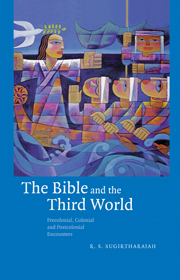Book contents
- Frontmatter
- Contents
- Acknowledgements
- 1 Introduction
- PART I PRECOLONIAL RECEPTION
- PART II COLONIAL EMBRACE
- 2 White men bearing gifts: diffusion of the Bible and scriptural imperialism
- 3 Reading back: resistance as a discursive practice
- 4 The colonialist as a contentious reader: Colenso and his hermeneutics
- 5 Textual pedlars: distributing salvation – colporteurs and their portable Bibles
- PART III POSTCOLONIAL RECLAMATIONS
- Afterword
- Select bibliography
- Index of biblical references
- Index of names and subjects
2 - White men bearing gifts: diffusion of the Bible and scriptural imperialism
Published online by Cambridge University Press: 02 December 2009
- Frontmatter
- Contents
- Acknowledgements
- 1 Introduction
- PART I PRECOLONIAL RECEPTION
- PART II COLONIAL EMBRACE
- 2 White men bearing gifts: diffusion of the Bible and scriptural imperialism
- 3 Reading back: resistance as a discursive practice
- 4 The colonialist as a contentious reader: Colenso and his hermeneutics
- 5 Textual pedlars: distributing salvation – colporteurs and their portable Bibles
- PART III POSTCOLONIAL RECLAMATIONS
- Afterword
- Select bibliography
- Index of biblical references
- Index of names and subjects
Summary
It took God longer to write the Bible than it has taken Him to build the British Empire.
Wm MacdonaldChristianity, or European influence, advances with sword or paper treaties in one hand, and the Bible or a case of gin in the other – as it appears to the native mind.
A. S. WhiteOne of the pivotal moments in history was the unprecedented political, economic and cultural transformation that affected the peoples of Asia, Africa, Latin America and the Pacific as the result of European expansion. Each continent has its own date marking the start of European territorial colonization. The year 1492 is generally seen as the beginning of the conquest of Latin America; 1498 for Asia, and especially for India when the Portuguese adventurer Vasco da Gama reached Calicut on the south-west coast of India; and 1625 for the occupation of South Africa, pointing ahead to the scramble for that continent and its eventual partition and parcelling out among European nations. Scriptural imperialism began later, nearly two centuries after these territorial conquests. This chapter aims to map out the landscape of scriptural production and of the dissemination of the Bible leading to its circulation on a massive scale, through the agency of the British and Foreign Bible Society, and then to delineate some marks of colonial interpretation.
VENERABLE VERSIONS AND PAUCITY OF BIBLES
The map that I shall draw is the one created by the Bible Society itself to establish the perspective in which it set its own origination.
- Type
- Chapter
- Information
- The Bible and the Third WorldPrecolonial, Colonial and Postcolonial Encounters, pp. 45 - 73Publisher: Cambridge University PressPrint publication year: 2001

